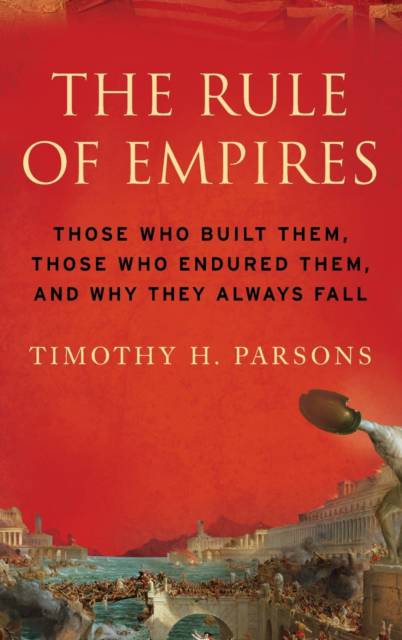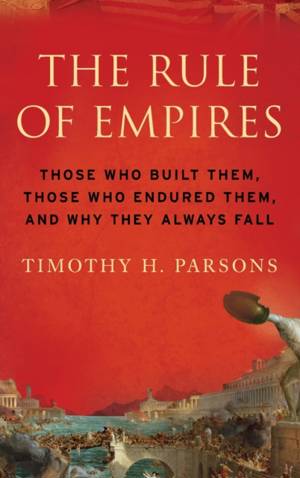
Wil je zeker zijn dat je cadeautjes op tijd onder de kerstboom liggen? Onze winkels ontvangen jou met open armen. Nu met extra openingsuren op zondag!
- Afhalen na 1 uur in een winkel met voorraad
- Gratis thuislevering in België vanaf € 30
- Ruim aanbod met 7 miljoen producten
Wil je zeker zijn dat je cadeautjes op tijd onder de kerstboom liggen? Onze winkels ontvangen jou met open armen. Nu met extra openingsuren op zondag!
- Afhalen na 1 uur in een winkel met voorraad
- Gratis thuislevering in België vanaf € 30
- Ruim aanbod met 7 miljoen producten
Zoeken
The Rule of Empires

Those Who Built Them, Those Who Endured Them, and Why They Always Fall
Parsons
Hardcover | Engels
€ 32,45
Prijzen
Omschrijving
In The Rule of Empires, Timothy Parsons gives a sweeping account of the evolution of empire from its origins in ancient Rome to its most recent twentieth-century embodiment. He explains what constitutes an empire and offers suggestions about what empires of the past can tell us about our own historical moment.
Parsons uses imperial examples that stretch from ancient Rome, to Britain's new imperialism in Kenya, to the Third Reich to parse the features common to all empires, their evolutions and self-justifying myths, and the reasons for their inevitable decline. Parsons argues that far from confirming some sort of Darwinian hierarchy of advanced and primitive societies, conquests were simply the products of a temporary advantage in military technology, wealth, and political will. Beneath the self-justifying rhetoric of benevolent paternalism and cultural superiority lay economic exploitation and the desire for power. Yet imperial ambitions still appear viable in the twenty-first century, Parsons shows, because their defenders and detractors alike employ abstract and romanticized perspectives that fail to grasp the historical reality of subjugation.
Writing from the perspective of the common subject rather than that of the imperial conquerors, Parsons offers a historically grounded cautionary tale rich with accounts of subjugated peoples throwing off the yoke of empire time and time again. In providing an accurate picture of what it is like to live as a subject, The Rule of Empires lays bare the rationalizations of imperial conquerors and their apologists and exposes the true limits of hard power.
Parsons uses imperial examples that stretch from ancient Rome, to Britain's new imperialism in Kenya, to the Third Reich to parse the features common to all empires, their evolutions and self-justifying myths, and the reasons for their inevitable decline. Parsons argues that far from confirming some sort of Darwinian hierarchy of advanced and primitive societies, conquests were simply the products of a temporary advantage in military technology, wealth, and political will. Beneath the self-justifying rhetoric of benevolent paternalism and cultural superiority lay economic exploitation and the desire for power. Yet imperial ambitions still appear viable in the twenty-first century, Parsons shows, because their defenders and detractors alike employ abstract and romanticized perspectives that fail to grasp the historical reality of subjugation.
Writing from the perspective of the common subject rather than that of the imperial conquerors, Parsons offers a historically grounded cautionary tale rich with accounts of subjugated peoples throwing off the yoke of empire time and time again. In providing an accurate picture of what it is like to live as a subject, The Rule of Empires lays bare the rationalizations of imperial conquerors and their apologists and exposes the true limits of hard power.
Alleen bij Standaard Boekhandel
Beoordelingen
We publiceren alleen reviews die voldoen aan de voorwaarden voor reviews. Bekijk onze voorwaarden voor reviews.














